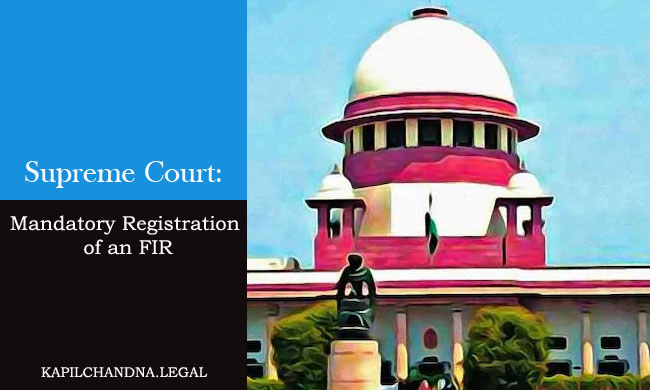Supreme Court: Mandatory Registration of an FIR
Every person whether aggrieved or not, of an offence “committed or attempted” is expected to call or approach the police at first instance and get it reported.
After the offence is reported, the police will look into allegations and identify whether the offence reported is a cognizable offence or non-cognizable offence.
If the offence discloses a cognizable offence, the police is bound to register an FIR as per Section 154 of The Code Criminal Procedure,1973.
If the offence reported is a non-cognizable offence, the police can register a report as per section 155 of The Code of Criminal Procedure,1973.
Since Cognizable offence and Non-Cognizable offences are not defined in the Indian Penal Code, 1860
However, the Code of Criminal Procedure,1973 contains Schedule I which refers to all the offences under the Indian Penal Code,1860 and puts them into cognizable and non-cognizable categories.
The Code of Criminal Procedure,1973 section 2 states that:-
(c) ” cognizable offence” means an offence for which, and” cognizable case” means a case in which, a police officer may, in accordance with the First Schedule or under any other law for the time being in force, arrest without warrant;
(l) ” non- cognizable offence” means an offence for which, and” non-cognizable case” means a case in which, a police officer has no authority to arrest without warrant;
Generally speaking cognizable offences are more serious in nature, therefore:-
- an FIR should be registered in those offences if reported,
- arrest without warrant can be made
- and a police can investigate without permission of a Magistrate.
Despite clear language of Section 154 of The Code of Criminal Procedure, 1973, a erogenous question arose before the Constitutional Bench of The Hon’ble Supreme Court in Lalita Kumari vs Govt.Of U.P.& Ors on 12 November, 2013 is whether:-
“a police officer is bound to register a First Information Report (FIR) upon receiving any information relating to commission of a cognizable offence under Section 154 of The Code of Criminal Procedure, 1973
or the police officer has the power to conduct a “preliminary inquiry” in order to test the veracity of such information before registering the same?”
Law Discussed
Section 154 of the Code uses the word “information” simpliciter and does not use the qualified words such as “credible information” or “reasonable complaint”.
‘Reasonableness’ or ‘Credibility’ of the said information is not a condition precedent for registration of a case.
The intention of the Parliament is unequivocally clear from the language employed that a mere information relating to commission of a cognizable offence is sufficient to register an FIR.
In Ramesh Kumari v. State (NCT of Delhi)
This Court has held that the provision of Section 154 is mandatory.
The police officer concerned is duty-bound to register the case on receiving information disclosing cognizable offence.
Genuineness or credibility of the information is not a condition precedent for registration of a case. That can only be considered after registration of the case.
Does Immediate FIR violate Article 21 of the Constitution of India, leading to Arbitrary Arrest?
While registration of FIR is mandatory, arrest of the accused immediately on registration of FIR is not at all mandatory.
In fact, registration of FIR and arrest of an accused person are two entirely different concepts under the law, and there are several safeguards available against arrest.
Moreover, it is also pertinent to mention that an accused person also has a right to apply for “anticipatory bail” under the provisions of Section 438 of the Code if the conditions mentioned therein are satisfied.
Joginder Kumar vs. State of U.P. & Ors., held that arrest cannot be made by police in a routine manner.
“No arrest can be made in a routine manner on a mere allegation of commission of an offence made against a person.
Denying a person of his liberty is a serious matter.
There must be some reasonable justification in the opinion of the officer effecting the arrest that such arrest is necessary and justified.
Except in heinous offences, an arrest must be avoided if a police officer issues notice to person to attend the Station House and not to leave the Station without permission would do.”
Exception to Mandatory registration of an FIR
Allegations relating to medical negligence on the part of doctors.
It will be unfair and inequitable to prosecute a medical professional only on the basis of the allegations in the complaint.
All that we are doing is to emphasize the need for care and caution in the interest of society; for, the service which the medical profession renders to human beings is probably the noblest of all, and hence there is a need for protecting doctors from frivolous or unjust prosecutions.
Many a complainant prefer recourse to criminal process as a tool for pressurising the medical professional for extracting uncalled for or unjust compensation.
Such malicious proceedings have to be guarded against.
Held:-
Registration of FIR is mandatory under Section 154 of the Code, if the information discloses commission of a cognizable offence and no preliminary inquiry is permissible in such a situation.
If the information received does not disclose a cognizable offence but indicates the necessity for an inquiry, a preliminary inquiry may be conducted only to ascertain whether cognizable offence is disclosed or not.
And the scope of preliminary inquiry is not to verify the veracity or otherwise of the information received but only to ascertain whether the information reveals any cognizable offence.
The police officer cannot avoid his duty of registering offence if cognizable offence is disclosed. Action must be taken against erring officers who do not register the FIR if information received by him discloses a cognizable offence.
As to what type and in which cases preliminary inquiry is to be conducted will depend on the facts and circumstances of each case.
Illustrative category of cases in which preliminary inquiry may be made are as under:
- Matrimonial disputes/ family disputes
- Commercial offences
- Medical negligence cases
- Corruption cases
- Cases where there is abnormal delay/ laches in initiating criminal prosecution, for example, over 3 months delay in reporting the matter without satisfactorily explaining the reasons for delay.




